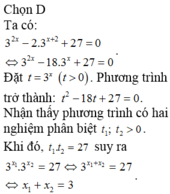Tổng tất cả các nghiệm của phương trình 3 2 x - 2 . 3 x + 2 + 27 = 0 bằng
A. 18
B. 27
C. 9
D. 3
Hãy nhập câu hỏi của bạn vào đây, nếu là tài khoản VIP, bạn sẽ được ưu tiên trả lời.



ta có \(\Delta=\left(2m-1\right)^2-4\left(m-2\right)\)
\(\Delta=4m^2-8m+9\)
\(\Delta=\left(2m-2\right)^2+5>0\)
do dó phương trình đã cho có 2 nghiệm phân biệt x1 ; x2
áp dụng định lí Vi-ét ta có: \(\hept{\begin{cases}s=x_1+x_2=2m-1\\p=x_1.x_2=m-2\end{cases}}\)
theo bài ra: x13 + x23 = 27
<=> (x1 + x2 )3 - 3x1x2 (x1+x2) - 27=0 <=> (2m-1)3 - 3(m-2) ( 2m-1) -27 =0
<=> 8m3 -12m2 +6m-1 - 6m2 +15m - 6 - 27 =0
<=> 8m3 - 18m2 + 21m - 34 =0 <=> (m-2)(8m2 -2m+17) = 0
\(\Rightarrow\hept{\begin{cases}m-2=0\\8m^2-2m+17=0\left(PTVN\right)\end{cases}}\) <=> m=2
Vậy m=2 thỏa mãn đề bài
( chú giải: PTVN là phương trình vô nghiệm)

\(a,3^{x-1}=27\\ \Leftrightarrow3^{x-1}=3^3\\ \Leftrightarrow x-1=3\\ \Leftrightarrow x=4\\ b,100^{2x^2-3}=0,1^{2x^2-18}\\ \Leftrightarrow10^{4x^2-6}=10^{-2x^2+18}\\ \Leftrightarrow4x^2-6=-2x^2+18\\ \Leftrightarrow6x^2=24\\ \Leftrightarrow x^2=4\\ \Leftrightarrow x=\pm2\)
\(c,\sqrt{3}e^{3x}=1\\ \Leftrightarrow e^{3x}=\dfrac{1}{\sqrt{3}}\\ \Leftrightarrow3x=ln\left(\dfrac{1}{\sqrt{3}}\right)\\ \Leftrightarrow x=\dfrac{1}{3}ln\left(\dfrac{1}{\sqrt{3}}\right)\)
\(d,5^x=3^{2x-1}\\ \Leftrightarrow2x-1=log_35^x\\ \Leftrightarrow2x-1-xlog_35=0\\ \Leftrightarrow x\left(2-log_35\right)=1\\ \Leftrightarrow x=\dfrac{1}{2-log_35}\)


Pt đã cho có 2 nghiệm pb khi:
\(\left\{{}\begin{matrix}m+1\ne0\\\Delta'=\left(m+3\right)^2-\left(m+1\right)\left(2m+9\right)>0\end{matrix}\right.\)
\(\Leftrightarrow\left\{{}\begin{matrix}m\ne-1\\-m^2-5m>0\end{matrix}\right.\)
\(\Leftrightarrow\left\{{}\begin{matrix}m\ne-1\\-5< m< 0\end{matrix}\right.\)
\(\Rightarrow m=\left\{-4;-3;-2\right\}\) có 3 giá trị nguyên

1.
Đặt \(\sqrt{x^2-4x+5}=t\ge1\Rightarrow x^2-4x=t^2-5\)
Pt trở thành:
\(4t=t^2-5+2m-1\)
\(\Leftrightarrow t^2-4t+2m-6=0\) (1)
Pt đã cho có 4 nghiệm pb khi và chỉ khi (1) có 2 nghiệm pb đều lớn hơn 1
\(\Leftrightarrow\left\{{}\begin{matrix}\Delta'=4-\left(2m-6\right)>0\\\left(t_1-1\right)\left(t_2-1\right)>0\\\dfrac{t_1+t_2}{2}>1\\\end{matrix}\right.\)
\(\Leftrightarrow\left\{{}\begin{matrix}10-2m>0\\t_1t_2-\left(t_1+t_1\right)+1>0\\t_1+t_2>2\end{matrix}\right.\)
\(\Leftrightarrow\left\{{}\begin{matrix}m< 5\\2m-6-4+1>0\\4>2\end{matrix}\right.\) \(\Leftrightarrow\dfrac{9}{2}< m< 5\)
2.
Để pt đã cho có 2 nghiệm:
\(\Leftrightarrow\left\{{}\begin{matrix}m\ne3\\\Delta'=1+4\left(m-3\right)\ge0\end{matrix}\right.\)
\(\Leftrightarrow\left\{{}\begin{matrix}m\ne3\\m\ge\dfrac{11}{4}\end{matrix}\right.\)
Khi đó:
\(x_1^2+x_2^2=4\Leftrightarrow\left(x_1+x_2\right)^2-2x_1x_2=4\)
\(\Leftrightarrow\dfrac{4}{\left(m-3\right)^2}+\dfrac{8}{m-3}=4\)
\(\Leftrightarrow\dfrac{1}{\left(m-3\right)^2}+\dfrac{2}{m-3}-1=0\)
\(\Leftrightarrow\left[{}\begin{matrix}\dfrac{1}{m-3}=-1-\sqrt{2}\\\dfrac{1}{m-3}=-1+\sqrt{2}\end{matrix}\right.\)
\(\Leftrightarrow\left[{}\begin{matrix}m=4-\sqrt{2}< \dfrac{11}{4}\left(loại\right)\\m=4+\sqrt{2}\end{matrix}\right.\)

ta có (2x+1)(x-1)2(2x+3)=(4x2+8x+3)(x2+2x+1)=18
đặt x2+2x+1=a ta có (4a-1)a=18
giải hệ trên ta được 2 nghiệm x=0,5 và x=-2,5
đến đay các ban tự giai tiếp nhé

a: \(27^{2-x}< =9\)
=>\(\left(3^3\right)^{2-x}< =3^2\)
=>\(3^{6-3x}< =3^2\)
=>6-3x<=2
=>-3x<=-4
=>\(x>=\dfrac{4}{3}\)
b: \(7^{3-x}< 49\)
=>\(7^{3-x}< 7^2\)
=>3-x<2
=>-x<2-3=-1
=>x>1
c: \(27^{3-x}>9\)
=>\(\left(3^3\right)^{3-x}>3^2\)
=>\(3^{9-3x}>3^2\)
=>9-3x>2
=>-3x>-7
=>\(x< \dfrac{7}{3}\)
d: \(2^{3-x}< 2^3\)
=>3-x<3
=>-x<0
=>x>0
e: \(27^{3-x^2}< 27^{x+1}\)
=>\(3-x^2< x+1\)
=>\(-x^2-x+2< 0\)
=>\(x^2+x-2>0\)
=>(x+2)(x-1)>0
=>\(\left[{}\begin{matrix}x>1\\x< -2\end{matrix}\right.\)